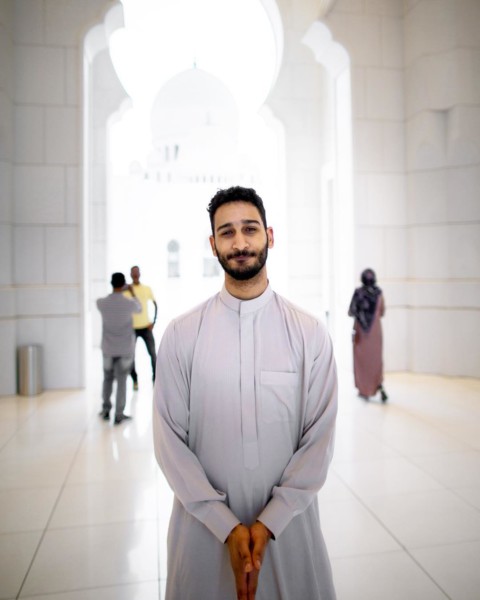In the summer of 2016, Aymann Ismail, an Egyptian-American journalist, accompanied a team of reporters and editors from Slate to shoot videos and take photos at the Republican National Convention in Cleveland. He was on line to get his press credentials when a man in a Thomas Jefferson costume approached him and asked, “Are you Muslim?” When Ismail replied in the affirmative, the man launched into a rant against Islam. He called the Prophet Muhammad a pedophile and Islam an evil religion, bent on teaching that women are unequal to men. It wasn’t the first time Ismail had been confronted by an Islamophobe, so he decided to respond with humor. “I did not want to be a victim of bigotry in front of all these people,” he told me recently. Ismail poked fun at the man’s Jefferson costume, and moved on.
One of Ismail’s colleagues filmed the exchange and sent it around the Slate office, where people praised Ismail’s handling of the confrontation. That was nice, but the incident still stung. “As much as I’d like to be the tough guy and be like, ‘No! It doesn’t matter, it is just words’—it hurts!” Ismail, who is thirty, said. A politics editor suggested that, for the next few days at the convention, Ismail walk up to attendees and introduce himself as a Muslim, then record their reactions. Ismail wasn’t thrilled by the idea of engaging with “bigots”; if a man is holding a sign that says “Ban Muslims,” one might not reasonably expect the guy’s mind to change. But Ismail saw potential for the exercise to help those watching the footage, by providing ammunition to deal with xenophobia. He left the convention with a piece that drew attention to America’s growing anti-Muslim sentiment. From that day on, Ismail was no longer just a journalist, but also the subject of his reporting.
The filmed encounters were the start of Who Is Afraid of Aymann Ismail?, an award-winning video series. “I have come to believe that many who speak out against Muslims are motivated by fear,” he wrote, introducing the project. “So I am going to confront those fears, one by one.” In the first episode, Ismail is seen interviewing a gay cousin of his—someone who had to leave home because his mother, unwilling to accept her son’s sexual orientation, threw gasoline on his face, intending to burn him. “The idea was never to solve the problem about Muslims in America,” Ismail said. “It was all about trying to complicate the narrative.”
In addition to homophobia, Ismail delved into hijabs, the #MeToo movement, blasphemy, extremism, and other contentious subjects in Muslim circles. He also routinely invited right-wing commentators who have stoked fear about Muslims. He hadn’t planned on appearing on camera: “I was really afraid of being dragged all over the internet and having my picture posted everywhere as some kind of terrorist suspect,” he said. But after he began shooting, he became convinced that his presence was necessary for the project to work. It did, however, make him a target of right-wing vitriol. “I showed up on a couple of sites with circles around my face,” he told me. He has received death threats. “Some people send me images of their guns and be like, ‘I have got a bullet with your name on it.’ ”

Aymann Ismail. Courtesy of subject.
The video series was a hit, Ismail said, but it was expensive to produce. After two seasons, he wrapped it up. Last year he pivoted to podcasting, with a project focused on masculinity. Man Up made its debut in May 2019 with an episode discussing “the urge to fight—to be aggressive and dominant—no matter the cost.” In conversations about parenting and male contraceptives, Ismail has thoughtful, sometimes embarrassing, moments on the show. His own identity—Muslim, American, male, straight—remains at the center. In a recent episode, a man who has trouble making fashion decisions tells Ismail, “I have a lot of male friends, but I don’t have any male friends that I’d be comfortable sending a picture of myself to and saying, ‘Hey, how does this shirt look on me? Do you think I should get it?’ I wish men were more comfortable having those kinds of relationships.”
The other day, at the Slate office in Downtown Brooklyn, Ismail, dressed in a caramel-colored hoodie stamped with the words newark is for hustlers, sat behind a desk in a recording studio, preparing to tape the week’s episode. The place seemed empty when he’d showed up. “I am not a morning person,” he said. He went to brew some coffee. Then he waited patiently while a sound engineer tried to connect with guests via Skype. Throughout the process, which took nearly thirty minutes of troubleshooting, Ismail sat in a relaxed state, with a serene look on his face. It was the same gentle demeanor that he brings to his interviews, hoping to extract insight and vulnerability from his subjects. “My favorite kind of journalism isn’t the type of journalism where there is a person who’s a scholar and they are going to list all of the things that they have learned,” Ismail said. “What I’m really looking for when I’m doing an interview is to have that aha moment where someone could say, ‘Oh my God, I totally feel differently about this.’ ”
Finally, the interviewees were on the line, starting with Claire, a female officer in the Air Force who spoke about how to bond with men when you don’t drink alcohol. “I am really excited about this topic, mostly because I don’t really drink,” Ismail said. “This is something that I have really struggled with.” Islam prohibits drinking alcohol; he had skipped Slate’s recent holiday party to avoid feeling awkward. “I wasn’t excited about hanging around and cheersing people with my cup of water,” he said.
Claire wasn’t Muslim; she’d decided to give up booze to be healthier. “I was looking more forward to the alcohol at events and the drinking—and drinking with people specifically—than I was the event itself,” she said. “It’s really hard to try to stand on your own two feet without that sort of excuse to lower your inhibitions.”
Ismail replied that when he’s at a bar, he almost always ends up ordering a mocktail—and he still feels guilty. His aim, always, is to be fully present. Drinking “almost feels like a cop-out,” he told Claire. “You can be silly, be goofy, be a different version of yourself—and allow yourself to be vulnerable around other people.” In his view, real connectedness and empathy needn’t involve—and isn’t the sole province of—alcohol. To Ismail, it belongs in the sacred domain of journalism.
Zainab Sultan is a former CJR Delacorte Fellow. Follow her on Twitter @ZainabSultan.


